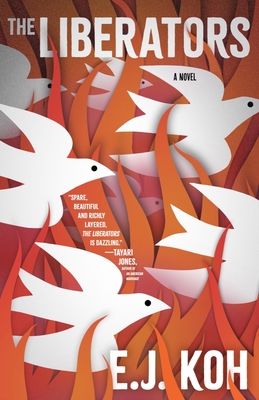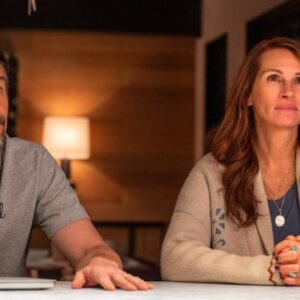
On a Friday two years after the Olympics, I was seven and sitting in the Hankook Market food court, where my mother batter-fried me squid legs. When Robert found me, I told him my age without using my fingers. Robert took me to the loading dock and told me to hold out my hands but no peeking. Something heavy closed the space in my arms. I locked my fingers to keep it against my chest. Opening my eyes, I met a dog whose paws rested in the air. Just twelve pounds, the dog fit perfectly in my arms. The dog was a short-haired terrier with pointy ears, a stout body, and bright eyes. He was black with tan eyebrows, and he smelled like the ocean. The dog sniffed me, nose tugging, and I loved the dog with my whole heart.
Robert folded the box he’d brought the dog in and tossed it over the dock. “He’s an older guy,” he said. “But this is a country where the dogs are happy their whole lives.”
I brushed the dog’s broad back. “We can learn to talk to each other.” The dog glanced at me approvingly.
Robert looked impressed, but a little serious. “He’s still a dog. You don’t want a dog thinking he’s not a dog.”
I considered this for a moment. “A dog can say things without talking at all,” and I put my face close to the dog’s. The dust that swirled around us at the dock had once been a restaurant with girls and cooks, or doves flapping their wings in the air, or whispers and laughter and clapping, or oven hoods and firebombs, or soju and prayers, or televisions and apologies and waving flags, weighing less in the sun as they veered toward and away from us, and all that hope vanished into my next words. “Can I call you Toto?”
*
Frost came to the tops of the trees. When Toto sneaked out under the gate, the neighborhood kids chased him. So Toto went back to the boy. The boy was gentle in feeding him before going out the door. The boy’s father left rice on the floor and switched on the noisy box. The boy’s mother gave Toto dried fish and asked questions about the boy. The grandmother hid from Toto, which Toto permitted. Toto knew it was noon by the boy’s scent at the door. When the boy appeared, Toto pushed him down. The boy stroked Toto’s side. “I want to be like you, Toto.” They stretched out in a sunny spot on the floor. Then the boy rolled over. “Don’t worry, Toto. I’ve got a plan for us.” The boy packed his pockets with fruit. The napkins bruised with blueberries.
Toto and the boy walked to the fields, where they hunted rabbits and squirrels. Toto and the boy followed a hawk to an empty rabbit’s nest. They spotted a hornet, a warning, and changed direction. Chewing long grass, they rested outside a fox den. They split the berries and turkey slices the boy had taken from the house. The boy, watching Toto, devoured his meal off the ground like a dog.
They jumped when a squirrel showed itself. The boy stilled and said that a squirrel would act differently whether they responded as a disturbance or a presence. It was a compliment if the squirrel ignored them. Then the squirrel ran past them. They tracked it to where the cars reared their metal faces. The boy turned back around to the field and Toto followed. “That was close,” the boy said. “I can’t feel my heart.” He pressed his ear against Toto’s chest. “There it is. You’ve got both of ours in there.”
The boy found a rock and sat on it. He took out a pad of paper and showed it to Toto. “We’re here. These are the nests we found today. This is the trail home. This is where the cars are. Here is the market square.” The boy stood and looked around, squinting. “The scale is accurate.” The boy changed the orientation of the pad. He drew fruits and trees and insects. “This is what I learned today,” he said. “I’m your student, Toto. You can teach me anything.”
Back at the apartment, the boy’s mother tried to wash him, but he refused until she agreed to wash Toto with him. The boy scolded his mother, “Toto cares about me!”
Afterward, the boy took more turkey slices. They ate them off the floor. Their hairs dripping water, the boy said, “Now I see. I can taste better this way. The food is closer to my nose. If I close my eyes, I can taste it without eating it.”
One day, the boy came home carrying a pile of heavy books. They looked dangerous, but his mother was happy to see them.
The boy said he was going to learn how to communicate with animals.
The boy tore out a page and put it in his pocket. He sat cross-legged on the sidewalk in front of the apartment. Toto sensed the boy’s concentration.
Toto stayed beside him.
When the boy looked up, Toto looked also.
“Elephants stomp their feet to talk to each other. Frogs make drill sounds. Dolphins use sonar.” The boy stomped his feet over the ground. He pushed out his lips and made a noise. Closing his eyes, the boy clapped his hands. “I can tell, I can tell—you’re right there,” the boy said. “I got two ears and two nostrils like you, Toto.”
The boy told him, as Toto rolled onto his side, that he had found a part of Toto the boy hadn’t known was there. The boy said Toto acted the way Toto was supposed to. The boy wanted to release Toto from these expectations. The boy saw in Toto his real self—slipping past his best pretenses to be a mere dog.
The boy wanted to free Toto from the roles put on his kind. “Nobody’s ever asked you about yourself. Of course you don’t want to say anything. Maybe it’s been so long you forgot how to talk. But I can wait for you, Toto. Forever.”
Toto was pleased with the boy’s excitement.
The boy closed the book. “If I could ask you anything? Huh. I guess—did you have fun with me today?”
Toto lay on his back, the sun on his belly.
“Did you say something?”
Toto licked his lips—he was tired. Toto had been an old dog when he met the boy.
“Toto, do you love me?”
Toto, for the first time, felt a strong sensation from the boy. Toto recalled the feeling he’d had when he was tied outside for a long time. Toto rested his head on the boy.
“You make everything better, Toto. I don’t know what I’d do without you. If you ran away, you would come back, right? You would come back because you have a good home.”
The boy took his paw and drew a picture of them. An easy stillness fell around the sidewalk, and the sun was gobbled up by the horizon.
Toto licked the boy’s face. The boy fell back in surprise and, laughing, scooped Toto up in his arms. “You always kiss me. Did you know, Toto?” he said. “You can’t kiss yourself, except in a mirror!” They went outside and slept under the night sky, warm air passing over them. “I’ve been waiting for you my whole life, Toto.” The boy’s longing for Toto was an inseparable part of the boy. His longing had a scent, and it was how Toto knew him by heart.
__________________________________
Excerpted from The Liberators by E.J. Koh. Used with permission of the publisher, Tin House. Copyright © 2023 by E.J. Koh.


